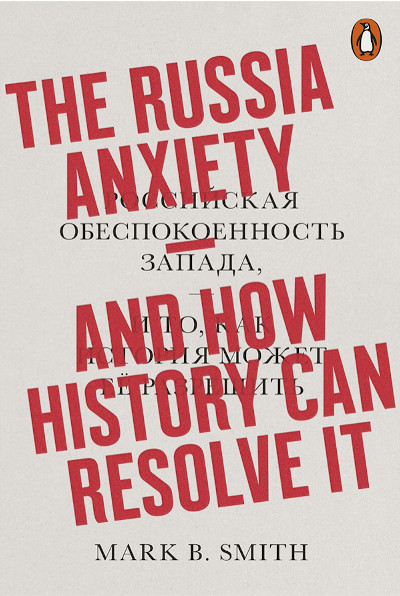In the picture
Cover of Mark B. Smith's book 'The Russian Anxiety and how history can solve it' (London: Penguin Books, 2020), 320 pp.
Russia has its black legend. Historian Mark B. Smith, a professor at Cambridge University, analyzes it in a book with a suggestive degree scroll , which could be translated as: Anxiety about Russia and how history can mitigate it. The book, written in 2019 [the edition used here is the 2020 Penguin paperback], describes the feelings that Russia arouses in Western countries since the 19th century, a fusion of fear, indifference and contempt, which recur and condition, to some extent, their future. This legend fosters Russophobia by simplifying Russia's history to a cycle of authoritarianism and failed reforms. The perspective has been promoted by Russia's adversaries and even - occasionally - by Russian elites for their own benefit. For Spaniards, this theory is familiar, popularized by Roca Barea in his programs of study on empires and black legend.
In the face of this image of Russia as a country locked in an implacable and threatening destiny, Smith proposes that the study of its history demonstrates, first of all, the absence of an imperialist approach in its foreign policy, so that neighboring countries would have no reason to fear. Thus, the author proposes numerous periods in which Russian rulers have prioritized their activity towards domestic policy. It is not surprising that he finds parallels in the social-political evolution of Russia with those of contemporary Western countries. This comparison, recurrent in the book, is the foundation that should help to relativize the anxiety that Russia produces: its case is nothing more than the result of the adaptation to Russia of the political-social elements of each historical moment, without great differences with the status of the neighboring countries.
For his study, although the author does not expressly use the concept of strategic culture, he relies on some elements that define it, especially those that examine the feelings, the soul of the Russians. For this purpose, he uses Russian authors from different periods, literary stories of historical or genre content and commonplaces that reaffirm an inescapable pessimism. As sample, Chernomyrdin's saying ("we wanted something better but things ended up as usual"), or Speransky's dilemma (the difficulty of incorporating citizens' rights in an autocratic system), reiterated in the text as a Sisyphean stone from which Russia cannot free itself. The profound ignorance of Russian history is not only attributed to Western countries but to the Russian people, with cases highlighted in the study, such as the magnitude of Stalin's purges and mass murders, the status of justice, or the extent of serfdom.
The reader is kept expectant until the conclusions, which are reached after having constructed a light historical framework with which to interpret the present. In them, Smith puts forward six principles (or hypotheses) with which to foreshadow a more reassuring future. He begins by limiting the importance of the past as a determinant of the future. Simultaneously, he selects aspects of Russian history (such as the evolution of its judicial system) that demonstrate the uniqueness of the country and, therefore, the limits of reductionist comparative analyses.
It also proposes to look at Russia as a "normal" country, endowed with a mixture of aspirations, caution and national sentiment, open to the world and grounded in a desire for individual respect. As an example, seen from this normality, the oligarchs are nothing more than the Russian version of the influential elites, which, in one configuration or another, exist in all countries.
The fourth hypothesis formulates that Russia belongs to Europe, but without adopting a Western identity, that of the countries forming "the West". Belonging to Europe is not without its ups and downs, but Smith assimilates them to those of the United Kingdom, whose Europeanness is not in question.
Moreover, it insists on the absence of reasons to still consider Russia a historical enemy. For this purpose, it resorts again to the comparison between countries of historical rivalry, such as France and England, with more than "a thousand years of confrontation" and now allies, status which it extends to Russia. In addition, it is argued that most of the wars in which Russia has been involved have been external aggressions, without a tendency to foreign intervention, which would make it a more stable and reliable actor.
For lovers of history and culture, the book is a historical tour in thematic brushstrokes, without a general chronological order, so a previous knowledge of the history of Russia is recommended. For lovers of geostrategy, the historical-political-cultural approach is not complemented by analyses of the evolution of strategic factors, especially security risks, vital interests and sources of economic production.
Moreover, the history of the world's largest country could claim a broader perspective, not just a historical comparison with Western countries. Even in the conclusions, the absence of a focus on Central and East Asia, the Pacific and the Arctic is evident. Such a vast, complex and rich country possesses sufficient arguments that require opening the focus east of the Urals.
Smith tries to justify the unfoundedness of the Russian black legend, using his interpretation of history as the basis of the argument, avoiding falling into unfounded speculation. The author also analyzes the position of the great Russian rival of the last century, the USA, highlights the adequate dissection of the Russian strategy in the Kenan telegram, and highlights the subsequent errors of interpretation committed by the US State department But reality is stubborn. Only three years after the publication of the book, Russia has started a new war of aggression, showing the shortcomings of the study, of which the author warns at the beginning. At least in that respect, the book has been anticipatory.

